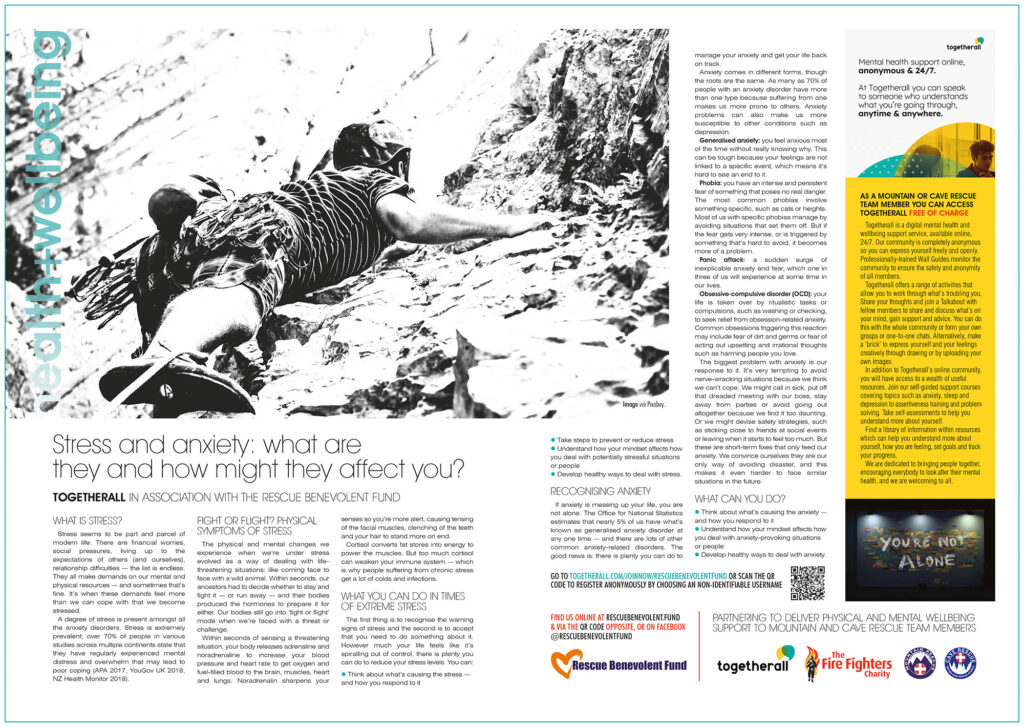Stress and anxiety: what they are and how they affect you
How to recognise the symptoms of stress and anxiety, and what to do to help yourself through them.
From the archive: Mountain Rescue Magazine Autumn Issue 82, October 2022. From Togetherall, in association with the Rescue Benevolent Fund.

What is stress?
Stress seems to be part and parcel of modern life. There are financial worries, social pressures, living up to the expectations of others (and ourselves), relationship difficulties — the list is endless. They all make demands on our mental and physical resources — and sometimes that’s fine. It’s when these demands feel more than we can cope with that we become stressed.
A degree of stress is present amongst all the anxiety disorders. Stress is extremely prevalent; over 70% of people in various studies across multiple continents state that they have regularly experienced mental distress and overwhelm that may lead to poor coping (APA 2017, YouGov UK 2018, NZ Health Monitor 2018).
Fight or flight? Physical symptoms of stress
The physical and mental effects of stress evolved as a way of dealing with life-threatening situations. Within seconds, our ancestors had to decide whether to stay and fight it or run away, and their bodies produced the hormones to prepare it for either. Our bodies still go into ‘fight or flight’ mode when we’re faced with a threat or challenge.
Within seconds, your body releases adrenaline and noradrenaline. Blood pressure and heart rate increase to get oxygen to the brain, muscles, heart and lungs. Noradrenalin sharpens your senses so you’re more alert. Facial muscles tense, the teeth clench, your hair stands more on end.
Cortisol converts fat stores into energy to power the muscles. But too much cortisol can weaken your immune system — which is why people suffering from chronic stress get a lot of colds and infections.
What you can do in times of extreme stress
First, recognise the warning signs of stress. Second, accept that you need to do something about it. However much your life feels like it’s spiralling out of control, there is plenty you can do to reduce your stress levels. You can:
- Think about what’s causing the stress — and how you respond to it
- Take steps to prevent or reduce stress
- Understand how your mindset affects how you deal with potentially stressful situations or people
- Develop healthy ways to deal with stress.
Recognising anxiety
If anxiety is messing up your life, you are not alone. The Office for National Statistics estimates that nearly 5% of us have what’s known as generalised anxiety disorder at any one time — and there are lots of other common anxiety-related disorders. The good news is: there is plenty you can do to manage your anxiety and get your life back on track.
Anxiety comes in different forms, but the roots are the same. 70% of people with an anxiety disorder have more than one type. Suffering from one makes us more prone to others. Anxiety also makes us more susceptible to other conditions such as depression.
Generalised anxiety: you feel anxious most of the time without really knowing why. This can be tough because your feelings are not linked to a specific event, which means it’s hard to see an end to it.
Phobia: you have an intense and persistent fear of something that poses no real danger. The most common phobias involve something specific, such as cats or heights. Most of us with specific phobias manage by avoiding situations that set them off. But if the fear is very intense, or is triggered by something that’s hard to avoid, it becomes more of a problem.
Panic attack: a sudden surge of inexplicable anxiety and fear, which one in three of us will experience at some time in our lives.
Obsessive-compulsive disorder (OCD): your life is taken over by ritualistic tasks or compulsions, such as washing or checking, to seek relief from obsession-related anxiety. Common obsessions may include fear of dirt and germs, or fear of acting out upsetting and irrational thoughts such as harming people you love.
Responding to anxiety
The biggest problem with anxiety is our response to it. It’s tempting to avoid nerve-wracking situations because we think we can’t cope. We might call in sick, put off that meeting with our boss, stay away from parties or avoid going out because we find it too daunting. Or we might devise safety strategies, such as sticking close to friends at social events or leaving when it feels too much. But these short-term fixes only feed our anxiety. We convince ourselves they are our only way of avoiding disaster, and this makes it harder to face similar situations in the future.
What can you do?
- Think about what’s causing the anxiety — and how you respond to it
- Understand how your mindset affects how you deal with anxiety-provoking situations or people
- Develop healthy ways to deal with anxiety.
Join Togetherall today
Mountain and cave rescue team members can join Togetherall’s online community. In just a few clicks you too can join the conversation and find people who know what you’re going through.
To register, go to togetherall.com/joinnow/RescueBenevolentFund. Register anonymously by choosing an non-identifiable username and start exploring.